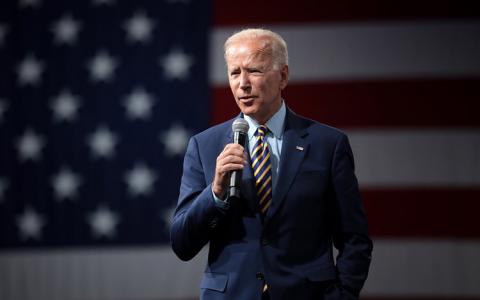
U.S. President Joe Biden on Thursday embraced a $1.2 trillion bipartisan Senate deal to renew the nation's roads, bridges and highways and help stimulate the economy -- a major breakthrough on one of his key domestic policy goals.
"We have a deal," Biden told reporters, flanked by Democratic and Republican senators who wrote the infrastructure proposal that followed months of White House negotiations with lawmakers.
Its $579 billion in new spending includes major investments in the nation's power grid, broadband internet services and passenger and freight rail.
But it does not contain other key priorities for Biden and progressive Democrats, such as new spending on home health care and child care, which Biden pitched as "human infrastructure." The Democrats who control Congress by razor-thin margins aim to cover those areas in another spending package that they want to maneuver through the Senate without Republican votes.
"This deal means millions of good-paying jobs and fewer burdens felt at the kitchen table ... But it also signals to ourselves, and to the world, that American democracy can deliver, and because of that it represents an important step forward for our country," Biden said later at the White House.
One member of the bipartisan group of 21 senators who negotiated the deal, Republican Rob Portman, said: "We didn't get everything we wanted but we came up with a good compromise."
He said they had commitments from Republicans and Democrats alike to get the plan "across the finish line."
Senate Republican Leader Mitch McConnell, who was briefed on the plan early on Thursday, did not answer questions about whether he would back the initiative.
The eight-year proposal contains $109 billion for roads, bridges and major projects; $73 billion for power infrastructure; $66 billion for passenger and freight rail; $65 billion for broadband access; $49 billion for public transit; and $25 billion for airports, according to a White House statement.
The investments would be paid for through more than a dozen funding mechanisms, including $100 billion in estimated tax revenues from a ramp-up in enforcement by the Internal Revenue Service, unused COVID-19 aid money and unemployment insurance funds returned by U.S. states.
Democratic and Republican members of the group displayed high spirits, chuckling and smiling together at microphones in the driveway of the White House.
NOT A PUNCHLINE
U.S. President Joe Biden speaks to Senator Rob Portman (R-OH), following a bipartisan meeting with U.S. senators about the proposed framework for the infrastructure bill, at the White House in Washington, U.S., June 24, 2021. REUTERS/Kevin Lamarque
The phrase "infrastructure week" became a Washington punchline during Donald Trump's four years as president after he promised to make such legislation a centerpiece but did not unveil a plan for Congress to consider, including financing mechanisms for projects.
Before the White House meeting, Portman told reporters on Capitol Hill that McConnell "remains open-minded and he's listening." Portman added, 'He hasn't made his decision."
McConnell did not respond later to questions from reporters about his position.
"They've done a lot of good work. There's a good framework there," said Senator John Thune, the chamber's No. 2 Republican, who also met with McConnell. He told reporters that party leaders would wait for the White House's response and discuss the framework with members of the caucus.
Democratic Senate Majority Leader Chuck Schumer said he supported the outline of the deal but wanted to see the details. He also noted that the $1.2 trillion bill focused on physical infrastructure would not get the Democratic votes needed to pass it without an accompanying package tackling social issues including home healthcare.
"All parties understand, we won't get enough votes to pass either, unless we have enough votes to pass both," Schumer said on the Senate floor. He said the Senate would aim for a vote on the bipartisan plan next month.
RECONCILIATION REDUX
Pelosi said that the House would only vote on the bipartisan bill after the Senate had also approved the additional spending package to be passed through a process called "reconciliation," which would allow Democrats to override Republican objections.
That could mean that the battle over these massive bills could extend into September and beyond.
Biden, seeking to fuel economic growth and address income inequality after the coronavirus pandemic, initially proposed spending about $2.3 trillion. Republicans chafed at his definition of infrastructure, which included fighting climate change and providing care for children and the elderly.
The White House later trimmed the offer to about $1.7 trillion in an unsuccessful bid to win the Republican support needed for any plan to get the 60 votes required to advance most legislation in the evenly split 100-seat Senate.
A major sticking point had been how to pay for the investments. Biden has pledged not to increase taxes on Americans earning less than $400,000 a year, while Republicans are determined to protect a 2017 cut in corporate taxes.
Thune said there were questions about whether watchdogs, including the Congressional Budget Office, would recognize some of the funding mechanisms as achieving savings.
This article originally appeared on Reuters.



